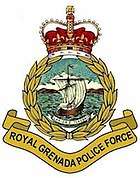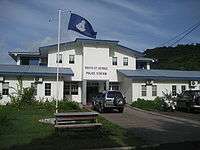Royal Grenada Police Force
The Royal Grenada Police Force (RGPF) is responsible for law enforcement in Grenada. The RGPF enforces criminal, immigration, and maritime laws. It is also held responsible for seaport security and fire services. With 15 police stations and 900 staff members, the force responds to over 15,000 crimes and incidents per year. The Royal Grenada Police Force also has a paramilitary force for national defense.[1]
| Royal Grenada Police Force | |
|---|---|
 |

It consists of 650 members, which includes an 80-member special services unit, a 30-member coast guard and an Immigration and Passport Department.
History
The RGPF dates back to 1853. In 1854, the RGPF was based at Fort George. During the brief revolutionary era in the early 80s, the RGPF was known simply as the Grenada Police Service. During this period, the police lost virtually all of its authority and was forced to delegate many of its powers with the newly formed People's Revolutionary Army. Its headquarters under the leadership of Prime Minister Maurice Bishop was moved from Fort George (renamed by that time to Fort Rupert) to Melville Street on 24 May 1979. The name was reverted and the police headquarters returned to Fort George following on 25 October 1983 following the military coup that was led by General Hudson Austin and the United States invasion of Grenada.[2] Prior to 1984, officers recruited into the force were trained at the Regional Police Training Centre in Barbados. Between the 1905–1907, the National Band of Grenada was established in the RGPF as a drum and Bugle Corps. It was then called the Government Band, which comprised volunteers including tradesmen. On 1 August 1967, the band was renamed RGPF band having Mr. Switch De Couteau as its first Inspector of Police as bandmaster.[3]
Former commissioners
- Stephen Bascombe (1969-1970)
- R. King (1970-1971)
- Rugent David (1971)
- R.L. Barrow (1971-1973)
- Nugent David (1973-1974)
- Osbert James (1974-1975)
- J. Usen (1975-1976)
- Osbert James (1976)
- Adonis Francis (1976)
- Osbert James (1976-1978)
- Anthony Bernard (1978)
- Osbert James (1978-1979)
- Raphael Stanislaus (1979)
- James Clarkson (1979-1981)
- A. B. Bernar (1981)
- Major Ian St. Bernard (1981)
- Major Patrick McLeish (1981-1983)
- Fitzroy Bedeau (1995-2005)[4]
Notes
- "Royal Grenada Police Force". Archived from the original on 2009-04-22. Retrieved 2009-01-18.
- https://www.thegrenadarevolutiononline.com/rgpf.html
- https://www.mgovernance.net/rgpf/police-band
- "Vote Grenada 2008 - New National Party candidate: Fitzroy Bedeau". www.caribbeanelections.com. Archived from the original on 2017-03-30. Retrieved 2017-03-29.
See also
- Mongoose Gang, a quasi-independent branch which operated from 1967 to 1979 under the control of Sir Eric Gairy, the Premier and later Prime Minister of Grenada, and head of the Grenada United Labour Party.[1]
External links
- "Eric Gairy : Biography". Archived from the original on 2013-10-09. Retrieved 2013-10-08.
.svg.png)